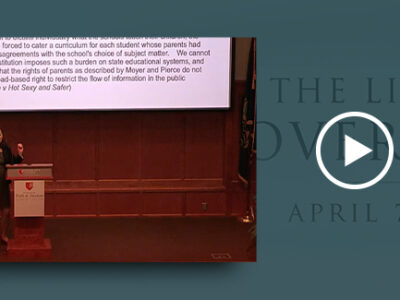Editor’s Note: The “V&V Q&A” is an e-publication from The Center for Vision & Values at Grove City College. Each issue will present an interview with an intriguing thinker or opinion-maker that we hope will prove illuminating to readers everywhere. In this latest edition, the executive director of The Center for Vision & Values, Dr. Paul Kengor, interviews Dr. Janice Brown, professor of English at Grove City College. This is the seventh installment in a series of special Q&As with participants in the forthcoming April 12-13 conference, “The De-Christianization of Europe: From Nicaea to Nietzsche,” to be held on the campus of Grove City College.
V&V: Dr. Brown, you will be part of an April 12 panel discussion on the “Inklings and Friends,” notably J.R.R. Tolkien, C.S. Lewis, and Dorothy Sayers—three very insightful English minds. The panel will examine what these three brilliant early- to mid-20th century Christians might today say about the decline in the Christian faith in Western Europe. Your subject will be Dorothy Sayers. Who were the Inklings and was Dorothy Sayers one of them?
Janice Brown: The Inklings were an intimate group of writers who shared a scholarly and creative bent, and who were directly connected with Oxford in the 1930s through 1950s. Their special bond was their Christian faith. Dorothy L. Sayers was also a successful writer who was scholarly and creative, and certainly outspokenly Christian, and she was a valued personal friend of a number of them. Although her education and her relentless academic edge was that of Oxford, Sayers was physically separated from the Inklings because she was not living in Oxford during those years, but even if she had been in close proximity she would not, as a woman, have been invited to attend Inklings meetings. It was very much a man’s world, and the Inkling clique was very much a male thing.
V&V: Who was Dorothy Sayers?
Brown: Dorothy L. Sayers—she was quite particular about including the middle initial ‘L.’ in her name, so I try to remember to use it—was a British writer who became well known first for her detective fiction (in the 1920s and 1930s), then for her Christian drama and apologetics (in the 1940s), and finally for her Dante scholarship (in the1950s).
V&V: You have written articles and books on Sayers. How did you become interested in her?
Brown: I began reading Sayers’s detective fiction in the mid 1980s for the fun of it, but went on to discover that her other work has an enormous range in form and subject. I quickly realized that her expertise and wisdom in so many fields was a rich area of study on which to write my PhD dissertation. My subsequent book, called The Seven Deadly Sins in the Work of Dorothy L. Sayers, was published by Kent State University Press in 1998, and was a finalist for the prestigious Edgar award.
V&V: Why is Sayers not as well known as Lewis and Tolkien?
Brown: In England in her own day, I think she was as well known as Lewis, and possibly more well known than Tolkien. She was, in fact, so prominent as a Christian spokesperson that she was offered an honorary doctoral degree by the Archbishop of Canterbury. In America, however, there has never been a mania connected with her works as there has been in the case of Lewis and Tolkien. This is probably because, of her major works, those that are both creative and Christian happen to be plays rather than novels, and there has never been much interest in good Christian drama in this country. I wish there would be a mania for Christian drama. It’s about time Americans were exposed to well written plays about eternal truth!
V&V: Those indeed are in short supply. What can we learn from Sayers’ writings—namely, about the Christian faith, about human nature and sin? What can she teach us?
Brown: Sayers makes it clear that the Christian faith is meaty, it’s for adults, it’s “the food of the full-grown.”
One of her many strong opinions regarding human nature that I especially appreciate is the view that stupidity is more often than not a choice.
Her many insights on the subject of sin are based on her recognition that original sin occurs in the forms traditionally recognized as the seven Cardinal—or Deadly—Sins. Of these, the sin of Sloth, she emphasizes, is strikingly present in the modern world. The world calls it Tolerance, but it is truly a desperate and deadly condition of the heart. Sloth is the sin that believes nothing, loves nothing, hates nothing, finds purpose in nothing.
V&V: Did Sayers foresee a decline in the faith in Western Europe? Would she be surprised at the state of the faith in Europe today?
Brown: By the 1940s, Dorothy L. Sayers had become acutely aware that the steady decline in Christian knowledge and Christian faith was unstoppable. I think that the limitation of spiritual resources that she observed in people during the crisis of World War II was one of the things that most impressed her with the fact that Christianity was no longer the underpinning of British life. She saw that Christian views were now “unpopular opinions,” and so that is the title she gave to her book of essays published in 1946.
She would not be surprised at the state of the faith in Europe today—at the almost universal secularism—so much as she would be disappointed at the failure of many Christians to meet the challenge to “fight the good fight” by providing an exciting and intelligent alternative to secularism.
V&V: Dr. Brown, thanks for talking to us. We look forward to hearing you and Drs. Jim Dixon and Paul Schaefer in your panel discussion on April 12.



